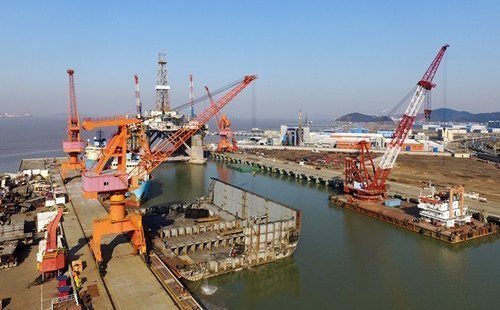China bans foreign ships heading for scrap

China, which has led the world in green ship recycling, is shutting its doors to foreign ships heading to its shores to be broken up.
The People’s Republic is expected to exit from the global shipbreaking market following Beijing’s latest environmental edict, which bans the import of ships and offshore units for scrapping as part of a wider ban on importing a total of 16 different types of waste materials.
China has been gradually increasing its number of restrictions on the imports of all sorts of waste materials over the past year.
The government said the new regulation, which will be effective from December 31 this year, will strengthen China’s determination to further prevent and control environmental pollution in the country, once the world’s largest importer of waste materials.
The upcoming ban has put a gloomy outlook on the ship recycling industry in China and has triggered huge concerns by domestic shipbreaking yards, who will now have to rely on just local vintage ships for business.
An official at the China National Ship Recycling Association told Splash that the association has been calling on the central government to put scrap ship imports into the automatic approval category for the past few years as it believes the use of recycled steel would greatly reduce energy consumption and emissions from steel producers, which fits the central government’s supply-end reform strategy, while the domestic shipbreaking yards have been improving their environmental standards and are capable of recycling the ships in the greenest way possible.
Chinese recycling yards have led the world in dismantling ships in an environmentally friendly way, with ships being taken apart in dock rather than beached. Top lines such as P&O Nedlloyd (and latterly Maersk once it bought the Anglo-Dutch line) helped develop China’s ship recycling scene this century. However, the methods have always come at a big price differential with competitors in south Asia.
According to data by NGO Shipbreaking Platform, China ranked the fourth in the world in 2017 in terms of shipbreaking volumes following Bangladesh, India and Pakistan. The nation scrapped 2.29m gt of ships, accounting for approximately 11% of 20.7m gt scrapped worldwide in the year. Comparing with the previous year, China had an increase in the number of ships but a clear decrease in gt recycled.
“The import of scrapped ships shouldn’t be completely banned. It would force lots of domestic shipbreaking yards to transform their business which would be very difficult for them as the shipbuilding and ship repair sectors are all still facing overcapacity issues, and many yard employees will lose their jobs,” the official from the recycling association warned.
“It remains unclear how the ban will be implemented. But I think it is better to strengthen regulations on the market rather than banning it completely, the government should at least guide the sector through it,” said Wang Yanfeng, a local analyst covering the steel industry.
Although the ban is causing a stir in China, international players in the shipbreaking industry believes the ban would have little impact on the overall shipbreaking sector.
“I do not expect the overall impact to be that significant on the international ship recycling sector as Chinese prices have not been competitive at all over the last few years – even on green tonnage which goes to India or to Turkey. We may see more Chinese vessels heading to the sub-continent shores now that the subsidies have ended however,” said Jamie Dalzell, a senior trader with GMS in Singapore. GMS is one of the world’s top cash buyers of ships for recycling.
Beijing for the past two years has been encouraging the scrapping of older ships with subsidies which are also now being phased out.
“The main impact will may be on the green recycling side, as China will be out for those wishing to choose green recycling, more Indian breakers will be chosen to recycle these vessels and more Indian breakers may be upgraded in order to comply with the standards of the Hong Kong Convention green recycling yards,” commented Leo Liu, a senior trader with GMS in China.
A number of Indian yards have in recent years upgraded facilities to become compliant with the Hong Kong Convention, which aims to make ship recycling more environmentally friendly.
